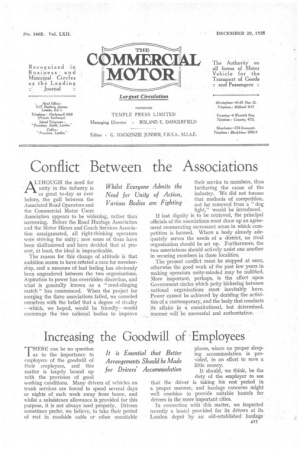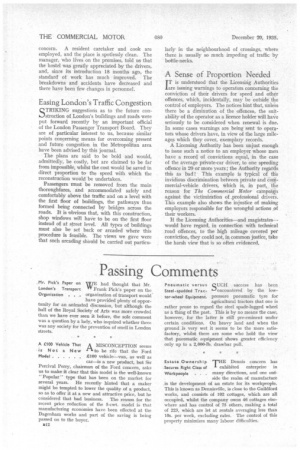Increasing the Goodwill of cE m pl oyees T HERE can be no question
Page 21

Page 22

If you've noticed an error in this article please click here to report it so we can fix it.
as to the importance to employers of the goodwill of their employees, and this matter is largely bound up with the provision of good working conditions. Many drivers of vehicles on trunk services are forced to spend several days or nights of each week away from home, and whilst a subsistence allowance is provided for this purpose, it is not always Used properly. Drivers sometimes prefer, we believe, to take their period of rest in roadside cafes or other unsuitable places, where no proper sleeping accommodation is provided, in an effort to save a little money.
It should, we think, be the duty of the employer to see that the driver is taking his rest period in a proper manner, and haulage concerns might well combine to provide suitable hostels for drivers in the more important cities.
In connection with this matter, we inspected recently a hostel provided for its drivers at its Loridon depot by an old-established haulage concern. A resident caretaker and cook are employed, and the place is spotlessly dean. The manager, who lives on the premises, told us that the hostel was greatly appreciated by the drivers, and, since its introduction 18 months ago, the standard of work has much improved. The breakdowns and accidents have decreased and there have been few changes in personnel.
Easing London's Traffic Congestion
STRIKING suggestions as to the future construction of London's buildings and roads were put forward recently by an important official of the London Passenger Transport Board. They are of particular interest to us, because similar points concerning means for overcoming present and future congestion in the Metropolitan area have been advised by this journal.
The plans are said to be bold and would, admittedly, be costly, but are claimed to be far from impossible, whilst the cost would be saved in direct proportion to the speed with which the reconstruction would be undertaken.
Passengers must be removed from the main thoroughfares, and accommodated safely and comfortably above the traffic and on a level with the first floor of buildings, the pathways thus formed being connected by bridges across the roads. It is tabvious that, with this construction, shop windows will have to be on the first floor instead of at street level. All types of buildings must also be set back or arcaded where this procedure is feasible. The views we gave were that such arcading should be carried out particu larly in the neighbourhood of crossings, where there is usually so much impeding of traffic• by bottle-necks.
A Sense of Proportion Needed
I T is understood that the Licensing Authorities are issuing warnings to operators concerning the conviction of their drivers for speed and other• offences, which, incidentally, may be outside the control of employers. The notices hint that, unless there be a diminution of the offences, the suitability of the operator as a licence holder will have seriously to be considered when renewal is due. In some cases warnings are being sent to operators whose drivers have, in view of the large mileages which they cover, exemplary records.
A Licensing Authority has been unjust enough to issue such a notice to an employer whose men have a record of convictions equal, in the case of the average private-car driver, to one speeding offence in 20 or more years ; the Authority regards this as bad This example is typical of the invidious discrimination between private and commercial-vehicle drivers, Which is, in part,.: the reason for The Commercial Motor campaign against the victimization of .professional drivers. This example also shows the injustice of making employers responsible for the wrongful actions of their workers.
If the Licensing Authorities—and magistrates-would have regard, in connection with technical road offences, to the high mileage covered per conviction, they could not, in common justice, take the harsh view that is so often evidenced.




















































































